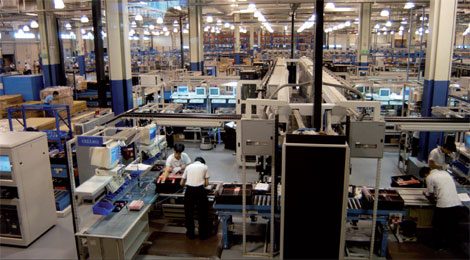Dell has logical reasons for moving logistical operations
Updated: 2011-10-21 09:08
By Lu Chang and Hu Meidong (China Daily)
|
|||||||||
|
|
Weather is one of the reasons that Dell Inc opened its new regional headquarters for service business and its manufacturing base in Xiamen, a southeastern coastal city in China's Fujian province.
Xiamen, located in a subtropical region, certainly has a pleasant climate. But there are many other amenities that encouraged Dell, the world's third-largest personal computer maker by market share, to base its sales, production and operation center out of Xiamen over the bigger cities of Shanghai and Beijing.
Xiamen prides itself on new infrastructure, a mature logistics platform and one of China's largest deep-water ports, as well as being a logistics hub between the mainland and Northeast Asia, Southeast Asia and Taiwan.
"Xiamen is one of the nicest cities for living in China and it's very modern with a high disposable income," says Charles Cheung, managing director of Dell (China) Co Ltd.
"More importantly, it has a geographical advantage for its location between the Yangtze and Pearl river deltas. And it's very good for Dell to develop its logistic network and supply chain, as we rely mostly on the direct sales and build-to-order (business) model."
Dell, which has 8,000 employees in China out of a global team of more than 100,000, opened its first China facility in Xiamen in 1998. In 2006, a year after producing its 10 millionth PC in the country, Dell opened a second facility in Xiamen, doubling its manufacturing capacity.
The company also plans to add potentially thousands of new jobs with its new regional services center, which is expected to open in early 2012 and located in a new 22-story building in Wuyuan Bay, a new area for Yachts Exhibition Center in the northeast of Xiamen Island.
"China is already Dell's second-biggest market behind the US. We'll have a continued presence," he says. "We have a strong commitment to the economy here, but we're also proud of our social contribution. We have a long-term commitment to Xiamen and China."
Having a production base in China is necessary to sell in the Chinese mainland market. Thanks to Xiamen's location and long-term economic and trade relationship with Southeast Asia, Dell also supplies to the markets in Hong Kong, Taiwan, Japan and South Korea.
"Since 2001, we gradually shifted the production to Xiamen from Penang (Malaysia), and began to support desktop PCs for the Japanese market," Cheung says.
Across the Taiwan Straits from Xiamen is Taiwan, home to a number of computer and computer components makers. This provided Dell with a base of suppliers and other support services.
Dell's shipments to Taiwan used to be shipped out of the company's Malaysian factory in Penang. But considering the efficient logistics network and the low cost of transportation, last year Dell began to ship "made in Xiamen" computers directly to customers in Taiwan.
"The benefits also lie in the development of Xiamen's transportation system. The advanced infrastructure of Xiamen port and airport make it possible for us to lower freight shipping costs and reduce time spent on shipping."
According to the research firm IDC, Dell is currently China's second-largest supplier of computer systems, with a market share of 9 percent, ranking behind the Chinese computer giant Lenovo. IDC also estimates demand for computer systems in western China will grow at a 21 percent annual rate through 2014.
In August, the 50 millionth computer rolled off the production line in Xiamen. According to the local government, Dell brought in 35 billion yuan ($5.49 billion, 3.98 billion euros) in revenue last year and its sales revenue in China has grown eleven-fold during the past decade.
Major hardware makers, such as IBM Corp and Hewlett-Packard Co, are shifting their businesses to the software and services sectors to fuel growth as profit margins for hardware sales shrink because of growing competition and a slowing market.
Earlier this year, Dell Service signed a new contract with the Xiamen government to relocate its Chinese service regional headquarters to Xiamen.
The goal is to combine its hardware and software to provide customers with a complete package.
"We have been trying to shift our focus from being purely a hardware maker to an IT solutions provider, and we hope that the business of services and IT management solution can," Cheung says.
A latecomer in the services market, Dell mainly focuses on specific industries to provide tailor-made services instead of offering standardized services.
In the past 18 months, Dell bought nine companies to make a push into the services market. The $3.9 billion acquisition of the US-based Perot Systems Corp, known for digitizing medical records, made Dell the largest IT services provider in the healthcare sector in the US.
"Dell is also looking for the potential of acquisition in China, and bringing more services business to Xiamen," Cheung says. "This is in line with the local government's blueprint to update the structure from a purely manufacturing industry to a high-end and sophisticated industry."
Yu Weiguo, Party secretary of Xiamen, says that the establishment of Dell Services regional headquarter in Xiamen will be a strong, driving force to boost the development of local second and third industry, as well as enhance the industrial capabilities and competitiveness.
"In the future, Xiamen will make great efforts to provide better services and more opportunities for Dell's operation and growth," he says.
The company projects that its total spending in China on facilities, IT solutions, production and component purchases from suppliers will exceed $100 billion over the next decade in an attempt to boost sales to large corporations and in smaller cities.










